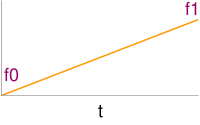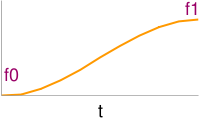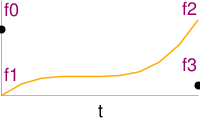Difference between revisions of "Interpolation"
(Added path interpolation function) |
|||
| Line 15: | Line 15: | ||
Linear interpolation of f0 and f1 with fraction t. | Linear interpolation of f0 and f1 with fraction t. | ||
<lsl> | <lsl> | ||
float fLin(float f0, float f1,float t){ | float fLin(float f0,float f1,float t) { | ||
return f0*(1-t) + f1*t;} | return f0*(1-t) + f1*t; | ||
} | |||
</lsl> | </lsl> | ||
| Line 54: | Line 55: | ||
Cosine interpolation of f0 and f1 with fraction t. | Cosine interpolation of f0 and f1 with fraction t. | ||
<lsl> | <lsl> | ||
float fCos(float v0,float v1,float t){ | float fCos(float v0,float v1,float t) { | ||
float F = (1 - llCos(t*PI))/2; | float F = (1 - llCos(t*PI))/2; | ||
return v0*(1-F)+v1*F;} | return v0*(1-F)+v1*F; | ||
} | |||
</lsl> | </lsl> | ||
| Line 94: | Line 96: | ||
Cubic interpolation of f0, f1, f2 and f3 with fraction t. | Cubic interpolation of f0, f1, f2 and f3 with fraction t. | ||
<lsl> | <lsl> | ||
float fCub(float f0,float f1,float f2,float f3,float t){ | float fCub(float f0,float f1,float f2,float f3,float t) { | ||
float P = (f3-f2)-(f0-f1);float Q = (f0-f1)-P;float R = f2-f0;float S = f1; | float P = (f3-f2)-(f0-f1);float Q = (f0-f1)-P;float R = f2-f0;float S = f1; | ||
return P*llPow(t,3) + Q*llPow(t,2) + R*t + S;} | return P*llPow(t,3) + Q*llPow(t,2) + R*t + S; | ||
} | |||
</lsl> | </lsl> | ||
| Line 150: | Line 153: | ||
float b2 = t3 - t2; | float b2 = t3 - t2; | ||
float b3 = -2*t3 + 3*t2; | float b3 = -2*t3 + 3*t2; | ||
return ( b0 * f1+b1 * a0+b2 * a1+b3 * f2 );} | return ( b0 * f1+b1 * a0+b2 * a1+b3 * f2 ); | ||
} | |||
</lsl> | </lsl> | ||
| Line 185: | Line 189: | ||
| return float fHem | | return float fHem | ||
| Returns hermite interpolation of four floats with tension and bias | | Returns hermite interpolation of four floats with tension and bias | ||
|} | |||
| Graph goes here, k. | |||
|} | |||
<div style="float:right;font-size: 80%;"> | |||
By Nexii Malthus</div> | |||
|} | |||
<!--############# FLOAT CATMULL-ROM #########--> | |||
{|cellspacing="0" cellpadding="3" border="1" style="border: 1px solid #aaaaaa; margin: 1em 1em 1em 0pt; background-color: #ffffff; border-collapse: collapse" width="80%" | |||
!style="color: #000000; background-color: #aaaaff;" height="20px"| | |||
Float Cubic Catmull-Rom | |||
|- | |||
| | |||
Catmull-Rom cubic interpolation spline of four floats with fraction t. The four floats are stored in a compact rotation format. | |||
<lsl> | |||
rotation mCat1 = <-0.5, 1.0, -0.5, 0.0>; | |||
rotation mCat2 = < 1.5, -2.5, 0.0, 1.0>; | |||
rotation mCat3 = <-1.5, 2.0, 0.5, 0.0>; | |||
rotation mCat4 = < 0.5, -0.5, 0.0, 0.0>; | |||
float fCatmullRom(rotation H, float t) { | |||
rotation ABCD = < | |||
(H.x * mCat1.x) + (H.y * mCat2.x) + (H.z * mCat3.x) + (H.s * mCat4.x), | |||
(H.x * mCat1.y) + (H.y * mCat2.y) + (H.z * mCat3.y) + (H.s * mCat4.y), | |||
(H.x * mCat1.z) + (H.y * mCat2.z) + (H.z * mCat3.z) + (H.s * mCat4.z), | |||
(H.x * mCat1.s) + (H.y * mCat2.s) + (H.z * mCat3.s) + (H.s * mCat4.s) | |||
>; | |||
rotation T; T.s = 1.0; T.z = t; T.y = T.z*T.z; T.x = T.y*T.z; | |||
return T.x*ABCD.x + T.y*ABCD.y + T.z*ABCD.z + T.s*ABCD.s; | |||
} | |||
</lsl> | |||
{|cellspacing="0" cellpadding="3" border="1" style="border: 1px solid #aaaaaa; margin: 1em 1em 1em 0pt; background-color: #ffffff; border-collapse: collapse" width="80%" | |||
| | |||
{|cellspacing="0" cellpadding="6" border="1" style="border: 1px solid #aaaaaa; margin: 1em 1em 1em 0pt; background-color: #e0e0ff; border-collapse: collapse" | |||
!style="background-color: #d0d0ee" | Input | |||
!style="background-color: #d0d0ee" | Description | |||
|- | |||
| rotation <float f0, float f1, float f2, float f3> | |||
|- | |||
| float t | |||
| Fraction of interpolation | |||
|- | |||
!style="background-color: #d0d0ee" | Output | |||
!style="background-color: #d0d0ee" | Description | |||
|- | |||
| return float fCatmullRom | |||
| Returns Catmull-Rom cubic interpolation | |||
|} | |} | ||
| Graph goes here, k. | | Graph goes here, k. | ||
Revision as of 11:33, 4 September 2011
| LSL Portal | Functions | Events | Types | Operators | Constants | Flow Control | Script Library | Categorized Library | Tutorials |
Interpolation Library
Float Functions
|
Float Linear | ||||||||||||||
|---|---|---|---|---|---|---|---|---|---|---|---|---|---|---|
|
Linear interpolation of f0 and f1 with fraction t. <lsl> float fLin(float f0,float f1,float t) { return f0*(1-t) + f1*t; } </lsl>
By Nexii Malthus
|
|
Float Cosine | ||||||||||||||
|---|---|---|---|---|---|---|---|---|---|---|---|---|---|---|
|
Cosine interpolation of f0 and f1 with fraction t. <lsl> float fCos(float v0,float v1,float t) { float F = (1 - llCos(t*PI))/2; return v0*(1-F)+v1*F; } </lsl>
By Nexii Malthus
|
|
Float Cubic | ||||||||||||||||||
|---|---|---|---|---|---|---|---|---|---|---|---|---|---|---|---|---|---|---|
|
Cubic interpolation of f0, f1, f2 and f3 with fraction t. <lsl> float fCub(float f0,float f1,float f2,float f3,float t) { float P = (f3-f2)-(f0-f1);float Q = (f0-f1)-P;float R = f2-f0;float S = f1; return P*llPow(t,3) + Q*llPow(t,2) + R*t + S; } </lsl>
By Nexii Malthus
|
|
Float Hermite | ||||||||||||||||||||||
|---|---|---|---|---|---|---|---|---|---|---|---|---|---|---|---|---|---|---|---|---|---|---|
|
Hermite interpolation of f0, f1, f2 and f3 with fraction t, tension and bias. <lsl> float fHem(float f0,float f1,float f2,float f3,float t,float tens,float bias){ float t2 = t*t;float t3 = t2*t;
float a0 = (f1-f0)*(1+bias)*(1-tens)/2;
a0 += (f2-f1)*(1-bias)*(1-tens)/2;
float a1 = (f2-f1)*(1+bias)*(1-tens)/2;
a1 += (f3-f2)*(1-bias)*(1-tens)/2;
float b0 = 2*t3 - 3*t2 + 1;
float b1 = t3 - 2*t2 + t;
float b2 = t3 - t2;
float b3 = -2*t3 + 3*t2;
return ( b0 * f1+b1 * a0+b2 * a1+b3 * f2 );
} </lsl>
By Nexii Malthus
|
|
Float Cubic Catmull-Rom | |||||||||||
|---|---|---|---|---|---|---|---|---|---|---|---|
|
Catmull-Rom cubic interpolation spline of four floats with fraction t. The four floats are stored in a compact rotation format. <lsl> rotation mCat1 = <-0.5, 1.0, -0.5, 0.0>; rotation mCat2 = < 1.5, -2.5, 0.0, 1.0>; rotation mCat3 = <-1.5, 2.0, 0.5, 0.0>; rotation mCat4 = < 0.5, -0.5, 0.0, 0.0>; float fCatmullRom(rotation H, float t) { rotation ABCD = <
(H.x * mCat1.x) + (H.y * mCat2.x) + (H.z * mCat3.x) + (H.s * mCat4.x),
(H.x * mCat1.y) + (H.y * mCat2.y) + (H.z * mCat3.y) + (H.s * mCat4.y),
(H.x * mCat1.z) + (H.y * mCat2.z) + (H.z * mCat3.z) + (H.s * mCat4.z),
(H.x * mCat1.s) + (H.y * mCat2.s) + (H.z * mCat3.s) + (H.s * mCat4.s)
>;
rotation T; T.s = 1.0; T.z = t; T.y = T.z*T.z; T.x = T.y*T.z;
return T.x*ABCD.x + T.y*ABCD.y + T.z*ABCD.z + T.s*ABCD.s;
} </lsl>
By Nexii Malthus
|
|
Float Rescale | ||||||||||||||||||
|---|---|---|---|---|---|---|---|---|---|---|---|---|---|---|---|---|---|---|
|
Rescales a value from one range to another range. <lsl> float fScl( float from0, float from1, float to0, float to1, float t ) { return to0 + ( (to1 - to0) * ( (from0 - t) / (from0-from1) ) ); } </lsl>
By Nexii Malthus
|
|
Float Rescale Fixed | ||||||||||||||||||
|---|---|---|---|---|---|---|---|---|---|---|---|---|---|---|---|---|---|---|
|
Rescales a value from one range to another range. The value is clamped between the range. <lsl> float fSclFix( float from0, float from1, float to0, float to1, float t ) { t = to0 + ( (to1 - to0) * ( (from0 - t) / (from0-from1) ) ); if(t < to0) t = to0; else if(t > to1) t = to1; return t; } </lsl>
By Nexii Malthus
|
Vector Functions
|
Vector Linear | ||||||||||||||
|---|---|---|---|---|---|---|---|---|---|---|---|---|---|---|
|
Linear interpolation of v0 and v1 with fraction t. <lsl> vector vLin(vector v0, vector v1,float t){ return v0*(1-t) + v1*t;} </lsl>
By Nexii Malthus
|
|
Vector Cosine | ||||||||||||||
|---|---|---|---|---|---|---|---|---|---|---|---|---|---|---|
|
Cosine interpolation of v0 and v1 with fraction t. <lsl> vector vCos(vector v0,vector v1,float t){ float F = (1 - llCos(t*PI))/2; return v0*(1-F)+v1*F;} </lsl>
By Nexii Malthus
|
|
Vector Cubic | ||||||||||||||||||
|---|---|---|---|---|---|---|---|---|---|---|---|---|---|---|---|---|---|---|
|
Cubic interpolation of v0, v1, v2 and v3 with fraction t. <lsl> vector vCub(vector v0,vector v1,vector v2,vector v3,float t){ vector P = (v3-v2)-(v1-v0);vector Q = (v1-v0)-P;vector R = v2-v1;vector S = v0; return P*llPow(t,3) + Q*llPow(t,2) + R*t + S;} </lsl>
By Nexii Malthus
|
|
Vector Hermite | ||||||||||||||||||||||
|---|---|---|---|---|---|---|---|---|---|---|---|---|---|---|---|---|---|---|---|---|---|---|
|
Hermite interpolation of v0, v1, v2 and v3 with fraction t, tension and bias. <lsl> vector vHem(vector v0,vector v1,vector v2,vector v3,float t,float tens,float bias){ float t2 = t*t;float t3 = t2*t;
vector a0 = (v1-v0)*(1+bias)*(1-tens)/2;
a0 += (v2-v1)*(1-bias)*(1-tens)/2;
vector a1 = (v2-v1)*(1+bias)*(1-tens)/2;
a1 += (v3-v2)*(1-bias)*(1-tens)/2;
float b0 = 2*t3 - 3*t2 + 1;
float b1 = t3 - 2*t2 + t;
float b2 = t3 - t2;
float b3 = -2*t3 + 3*t2;
return ( b0 * v1+b1 * a0+b2 * a1+b3 * v2 );}
</lsl>
By Nexii Malthus
|
Rotation Functions
|
Rotation Linear | ||||||||||||||
|---|---|---|---|---|---|---|---|---|---|---|---|---|---|---|
|
Spherical Linear interpolation of r0 and r1 with fraction t. Also known as SLERP <lsl> rotation rLin(rotation r0,rotation r1,float t){ // Spherical-Linear Interpolation float ang = llAngleBetween(r0, r1); if( ang > PI) ang -= TWO_PI; return r0 * llAxisAngle2Rot( llRot2Axis(r1/r0)*r0, ang*t);} </lsl>
By Nexii Malthus
|
|
Rotation Cosine | ||||||||||||||
|---|---|---|---|---|---|---|---|---|---|---|---|---|---|---|
|
Spherical Cosine interpolation of r0 and r1 with fraction t. I liken to call it as SCORP <lsl> rotation rCos(rotation r0,rotation r1,float t){ // Spherical-Cosine Interpolation float f = (1 - llCos(t*PI))/2; float ang = llAngleBetween(r0, r1); if( ang > PI) ang -= TWO_PI; return r0 * llAxisAngle2Rot( llRot2Axis(r1/r0)*r0, ang*f);} </lsl>
By Nexii Malthus
|
|
Rotation Cubic | ||||||||||||||||||||||
|---|---|---|---|---|---|---|---|---|---|---|---|---|---|---|---|---|---|---|---|---|---|---|
|
Spherical Cubic interpolation of r0 and r1 with fraction t. I liken to call it as SCURP <lsl> rotation rCub(rotation r0,rotation r1,rotation r2,rotation r3,float t){ // Spherical-Cubic Interpolation // r0 = Start, r1 = End, r2 and r3 affect path of curve! return rLin( rLin(r0,r1,t), rLin(r2,r3,t), 2*t*(1-t) );} </lsl>
By Nexii Malthus
| ||||||||||||||||||||||
Vector List
|
Vector List, Linear | ||||||||||||||
|---|---|---|---|---|---|---|---|---|---|---|---|---|---|---|
|
Interpolates between two vectors in a list of vectors. <lsl> vector pLin(list v, float t, integer Loop ){ float l = llGetListLength(v); t *= l-1;
float f = (float)llFloor(t);
integer i1 = 0; integer i2 = 0;
if(Loop){ i1 = (integer)(f-llFloor(f/l)*l);
++f;i2 = (integer)(f-llFloor(f/l)*l);}
else {
if( f > l-1 ) i1 = (integer)l-1;
else if( f >= 0 ) i1 = (integer)f;
if(f+1 > l-1 ) i2 = (integer)l-1;
else if(f+1 >= 0 ) i2 = (integer)f+1; }
vector v1 = llList2Vector(v, i1);
vector v2 = llList2Vector(v, i2);
return vLin( v1, v2, t-f );}
</lsl>
By Nexii Malthus
|
Speed Controlled
|
Rotation Cosine Aim | ||||||||||||||||||
|---|---|---|---|---|---|---|---|---|---|---|---|---|---|---|---|---|---|---|
|
Spherical Cosine interpolation of r0 and r1 with speed regulation. Does the entire animation loop to rotate between r0 to r1 with a specific speed, with the cosine interpolation it makes it appear to accelerate and deccelerate realistically. <lsl> rCosAim( rotation r0, rotation r1, float speed ){ float ang = llAngleBetween(r0, r1) * RAD_TO_DEG;
if( ang > PI) ang -= TWO_PI;
float x; float y = (ang/speed)/0.2;
for( x = 0.0; x < y; x += 1.0 )
llSetRot( rCos( r0, r1, x/y ) );
} </lsl>
By Nexii Malthus
| ||||||||||||||||||
Old non-documented Library
Changes/ 1.0-1.1 - Added rotation types 1.1-1.2 - Added Hermite for float and vector
<lsl> //===================================================// // Interpolation Library 1.2 // // "May 12 2008", "6:16:20 GMT-0" // // Copyright (C) 2008, Nexii Malthus (cc-by) // // http://creativecommons.org/licenses/by/3.0/ // //===================================================//
float fLin(float v0, float v1,float t){
return v0*(1-t) + v1*t;}
float fCos(float v0,float v1,float t){
float F = (1 - llCos(t*PI))/2; return v0*(1-F)+v1*F;}
float fCub(float v0,float v1,float v2,float v3,float t){
float P = (v3-v2)-(v0-v1);float Q = (v0-v1)-P;float R = v2-v0;float S = v1; return P*llPow(t,3) + Q*llPow(t,2) + R*t + S;}
float fHem(float v0,float v1,float v2,float v3,float t,float tens,float bias){
float t2 = t*t;float t3 = t2*t;
float a0 = (v1-v0)*(1+bias)*(1-tens)/2;
a0 += (v2-v1)*(1-bias)*(1-tens)/2;
float a1 = (v2-v1)*(1+bias)*(1-tens)/2;
a1 += (v3-v2)*(1-bias)*(1-tens)/2;
float b0 = 2*t3 - 3*t2 + 1;
float b1 = t3 - 2*t2 + t;
float b2 = t3 - t2;
float b3 = -2*t3 + 3*t2;
return ( b0 * v1+b1 * a0+b2 * a1+b3 * v2 );}
vector vLin(vector v0, vector v1,float t){
return v0*(1-t) + v1*t;}
vector vCos(vector v0,vector v1,float t){
float F = (1 - llCos(t*PI))/2; return v0*(1-F)+v1*F;}
vector vCub(vector v0,vector v1,vector v2,vector v3,float t){
vector P = (v3-v2)-(v0-v1);vector Q = (v0-v1)-P;vector R = v2-v0;vector S = v1; return P*llPow(t,3) + Q*llPow(t,2) + R*t + S;}
vector vHem(vector v0,vector v1,vector v2,vector v3,float t,float tens,float bias){
float t2 = t*t;float t3 = t2*t;
vector a0 = (v1-v0)*(1+bias)*(1-tens)/2;
a0 += (v2-v1)*(1-bias)*(1-tens)/2;
vector a1 = (v2-v1)*(1+bias)*(1-tens)/2;
a1 += (v3-v2)*(1-bias)*(1-tens)/2;
float b0 = 2*t3 - 3*t2 + 1;
float b1 = t3 - 2*t2 + t;
float b2 = t3 - t2;
float b3 = -2*t3 + 3*t2;
return ( b0 * v1+b1 * a0+b2 * a1+b3 * v2 );}
rotation rLin(rotation r0,rotation r1,float t){
// Spherical-Linear Interpolation float ang = llAngleBetween(r0, r1); if( ang > PI) ang -= TWO_PI; return r0 * llAxisAngle2Rot( llRot2Axis(r1/r0)*r0, ang*t);}
rotation rCos(rotation r0,rotation r1,float t){
// Spherical-Cosine Interpolation float f = (1 - llCos(t*PI))/2; float ang = llAngleBetween(r0, r1); if( ang > PI) ang -= TWO_PI; return r0 * llAxisAngle2Rot( llRot2Axis(r1/r0)*r0, ang*f);}
rotation rCub(rotation r0,rotation r1,rotation r2,rotation r3,float t){
// Spherical-Cubic Interpolation // r0 = Start, r1 = End, r2 and r3 affect path of curve! return rLin( rLin(r0,r1,t), rLin(r2,r3,t), 2*t*(1-t) );}
default{state_entry(){}}
</lsl>


